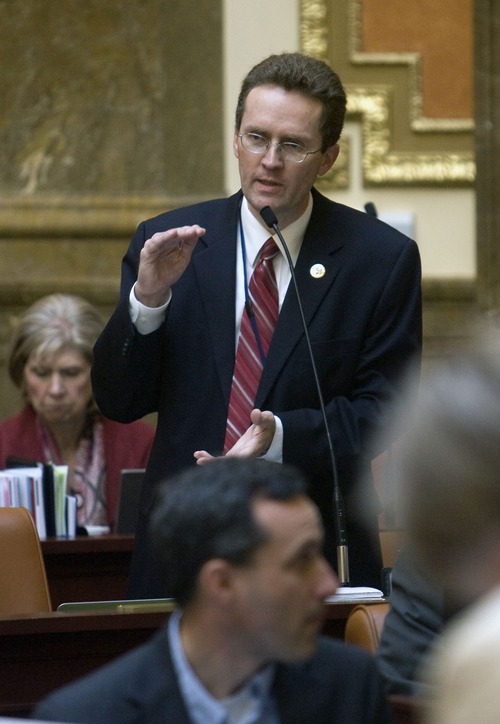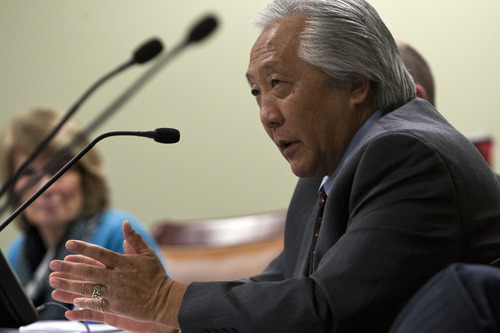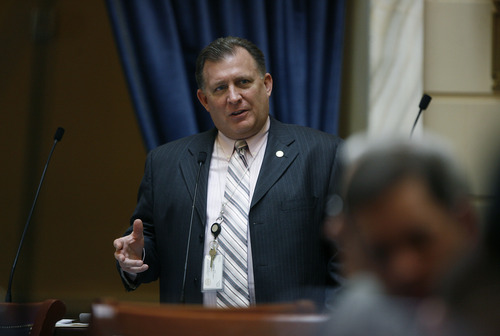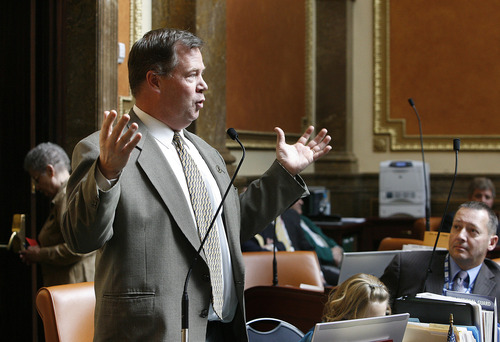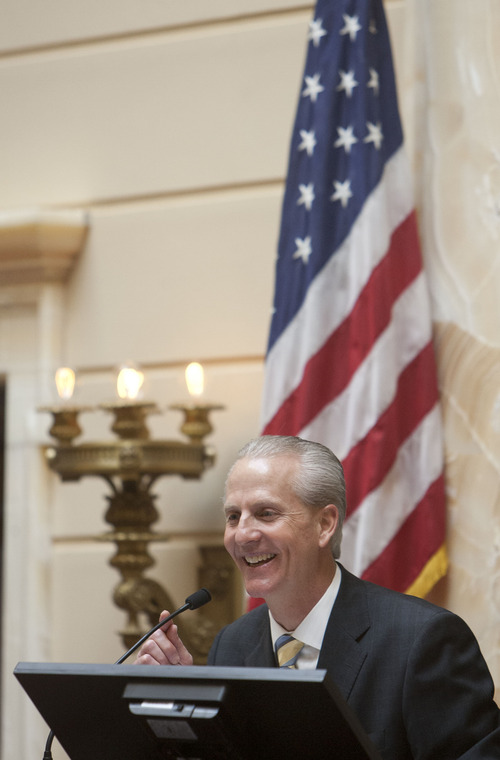This is an archived article that was published on sltrib.com in 2013, and information in the article may be outdated. It is provided only for personal research purposes and may not be reprinted.
When Utah legislators run into a conflict of interest on legislation, they vote on the bill anyway.
They have no choice.
Utah law requires it.
But in the past week they began debating again, as they have for years, whether it would be wise to allow themselves to abstain, or vote "present," in those situations. After all, such abstention amid conflicts is either required or allowed in 48 of the other 49 states — but Utah is a holdout.
Utah legislators do run into plenty of potential conflicts of interest because it is a part-time body — meeting 45 days a year — so members have regular "day jobs" besides being lawmakers. Almost any bill directly affects someone in the group of attorneys, doctors, lawyers, bankers, electricians, architects, ranchers, teachers, developers and business people, among many other occupations.
In fact, a Salt Lake Tribune analysis shows that one of every five bills introduced this year is sponsored by someone who faces a potential conflict of interest on it — not to mention conflicts the bills may create for others voting on it. Such bills often deal with a sponsor's profession, or organization boards that they sit on.
Leaders say that is the beauty and curse of a part-time citizen legislature: It brings together people with expertise in many areas to help improve legislation; but it also creates more potential conflicts — and creates a challenge to prevent self-dealing and maintain voter confidence.
Rep. Curt Oda, R-Clearfield, put it this way on his disclosure form, when it asked for items besides his insurance-industry job that could cause conflicts: "I am a member of the human race and a citizen of Utah, all of what the Legislature deals with will have a direct or indirect impact, either positively or negatively upon myself and my family."
Then he adds, "I am also a concealed-weapon-permit instructor," and he has often been involved in gun bills through the years.
—
Conflicts? • To illustrate how many potential conflicts occur — and how some may be more direct than others —The Tribune compared all bills introduced this year with the written conflict of interest statements filed by their sponsors.
The analysis found at least 152 bills and resolutions — 20 percent of all those filed — whose sponsors have extra expertise because it directly affects them or their profession, or, depending on one's view, it creates a potential conflict of interest.
It found 56 of Utah's 104 lawmakers sponsored at least one such bill. A chart with all those bills and sponsors is online at sltrib.com.
Some examples of what was found include:
• Reps. Jim Dunnigan, R-Taylorsville, and Jim Bird, R-West Jordan, both own insurance agencies. Between them, they sponsored six bills dealing with the insurance profession — such as HB47, Insurance Law Amendments, by Dunnigan; and HB65, Insurance Beneficiary Changes, by Bird.
• Sen. Evan Vickers, R-Cedar City, is a pharmacist and sponsored SB194, Pharmacy Practice Act Amendments.
• Sen. Howard Stephenson, R-Draper, is president of the Utah Taxpayers Association and sponsored bills that seek action favored by that group, such as SB34, affecting when bond elections can be scheduled, and SB33, Sales and Use Tax Revisions.
• Rep. Dean Sanpei, R-Provo, is vice president of Intermountain Healthcare and sponsored several health care bills, including HB135, Medical Malpractice Amendments, and HB57, Mental and Behavioral Health Amendments.
• Rep. Larry Wiley, D-West Valley City, is president of Elkay Consulting, which consults on building codes. He sponsored HB277, Building Code Amendments. Similarly, Rep. Brad Wilson, R-Kaysville, is a homebuilder and sponsored HB202, Energy Conservation Code Amendments.
• Rep. Lee Perry, R-Perry, is a Utah Highway Patrol lieutenant, and sponsored HB283 to toughen enforcement of seat belt laws, and HB103 to ban teen drivers from using cellphones while driving.
• House Majority Leader Brad Dee, R-Ogden, is the human resources director of Weber County, and sponsored HB193, Utah State Employment Amendments.
• Rep. Steve Eliason, R-Sandy, is vice president of the Utah Jazz retail division. He sponsored HB300 to give out-of-state online retailers incentives to collect Utah sales tax (which could eliminate price advantages they have over in-state retailers). He is also a scoutmaster, and sponsored HB145, which would allow donations to the Boy Scouts by checking a box on tax returns.
• Sen. Karen Mayne, D-West Valley City, is a former board member of the Utah Transit Authority and introduced bills that would give UTA buses the right of way when they try to merge into traffic after stopping, and a resolution calling for questions on safety around train crossings in driver license tests.
• At least 25 bills affect the pay of lawmakers, their ethics rules or their campaigns. All, of course, were sponsored by legislators affected by them.
—
Disclosure • Current rules require legislators to file written forms at the beginning of every session listing what they see as potential conflicts of interest, including naming their employers, boards they serve on, property they own and their spouse's employer.
If legislation arises that creates another conflict that a lawmaker either did not realize or forgot, rules require them to verbally disclose that before a vote.
Maryann Martindale, executive director of the progressive watchdog group Alliance for a Better Utah, says those rules may be inadequate.
"Nothing requires them after they file their written disclosure form to ever mention a conflict again. It's largely forgotten about," she says."They should be mandated to mention conflicts verbally, because it could make a big difference in context during debate."
For example, Martindale praises Senate President Wayne Niederhauser, R-Sandy, for saying during debate about moving the state prison and developing the land, that he owns land nearby, and Rep. Rebecca Chavez-Houck, D-Salt Lake City, for mentioning she sits on boards of several nonprofit groups in debate on bills affecting nonprofit organizations.
"It's important in debate to know about those kinds of things. But disclosing it verbally is not required, and too often what is on the written forms is not known or forgotten," she said.
Niederhauser, however, says he believes the current system is effective. "I am one of the cases in point," he says — noting he had listed his property near the prison on disclosure forms, and knew it could be an issue so he also mentioned it.
"I think it is very transparent what our conflicts are," he says. "So you can raise that in the press and … anyone in the political body can raise those questions and make sure there's not any self-dealing going on."
—
Debate • In the past week, the issue arose again about whether lawmakers should be required to vote when they have conflicts of interest. Rep. Jim Nielson, R-Bountiful, pushed HR4 which was to have allowed abstentions in the House — but it stalled in the House Rules Committee and was referred for interim study later this year.
Sen. Curt Bramble, R-Provo, says if the House were to enact such a rule, he also would push a similar change in the Senate — but notes he has failed in that attempt several times. "It bogged down in the past over language trying to define exactly what a conflict of interest is," Bramble says.
Nielson thought he could avoid that problem this year because HR4 would leave it up to members themselves to decide when a conflict was big enough for them to abstain. As he told the House Rules Committee, "This simply allows the lawmaker to use his or her conscience."
He also argued that 25 states mandate that their House members not vote when they have conflicts, and 23 others allow abstentions — so Utah mandating members to vote "is an unusual rule." He said the only way to avoid voting now is "to take a walk" to try to miss a vote, but a call of the House could compel the member to be found and cast the vote anyway.
Nielson added, "The current rule takes the issue of conflict of interest off the table when we vote. It means we as representatives do not have to consider when we vote whether we have a conflict of interest. We are required to vote and the media don't ask questions."
Rep. Eric Hutchings, R-Kearns, called Nielson's proposed change "a live hand grenade," possibly bringing dire consequences if members fail to abstain and later are found to have a perceived conflict of interest.
"I think if you blow it, you're going to get called in on the carpet and you may have hell to pay," Hutchings said. "Right now, if I'm not sure if I have a conflict or not. As long as I state it in writing, or as long as I stand up and state it, then I am covered."
Hutchings said HR4 could lead to many "people abstaining 'just in case.' And I think you're going to have even fewer people voting … instead of a transparency effect."
Niederhauser said a key reason the Legislature has never allowed abstaining is "that also can be abused. If you don't want to vote on a tough bill, you just abstain" — and rules would essentially make it a negative vote because most bills must achieve a majority of the Senate or House to pass.
"We're here to make the tough decisions," Niederhauser said. "We don't want a system that will give any kind of incentive to let the legislators avoid some of those hard decisions." —
Utah Legislature and conflicts
The 104 members of the state Legislature are part-time state officials who make their primary living from other occupations and businesses. While legislators must file conflict-of-interest statements prior to the session, nothing requires conflicts to be declared during debate. Utah also has an odd rule that senators and representatives must vote on all bills on the floor, potential conflict or not.


